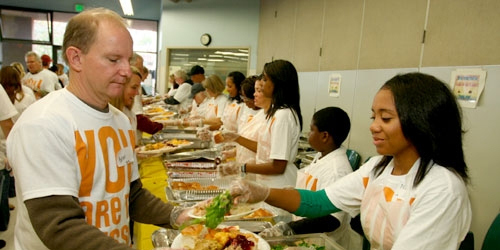Mary Jo Copeland will be cooking up a storm this Thanksgiving. Her guest list will include 400-500 people from Mary’s Place, the transitional housing community she has helped run for over 30 years, as well as their neighbors and anyone else down on their luck.
Located in Minneapolis, Minnesota, Mary’s Place is a Christian housing community of 92 furnished apartments named for the Blessed Virgin Mary. Guests at the shelter stay for an average of three to six months and during their stay they each get three meals a day.
Thanksgiving, however, is the day for Mary to go all out. She puts flowers on the tables, plays music and invites her guests to dance. Mary Jo said cooking a huge Thanksgiving feast and providing transitional shelter for struggling individuals and families is part of her faith.
“They are going through a hard time and they are really trying to get on their feet,” she said. “Devotion to God requires we take care of His people.”
Transitional housing complexes like Mary’s Place and temporary shelters across the country are more likely to reach maximum occupancy during cold winter months. Winter’s biting cold and gusty winds drive needy Americans into emergency overnight housing, leaving shelters scrambling to provide basic necessities like food, clothing and toiletries to the less fortunate.
According to the National Alliance to End Homelessness, an estimated 610,042 Americans are homeless on any given night. Andy Bales, the spokesperson at Union Rescue Mission in Los Angeles, says he has noticed two changes where he works on Skid Row, the downtown stretch that contains one of the largest population of homeless people in the United States.
Bales said there has been an increase in the number of people seeking help, and their physical and mental conditions have deteriorated compared to families who have sought help in previous years. The ethnic make up of impoverished families and individuals has changed too. Bales says Asian men, a demographic that was rarely seen on Skid Row, are now a constant presence.
“It has to be something in our society,” Bales said. “Family breakdown, unemployment, mental illness. We see a lot of those, and the families that come seem to need more help… Read More
Source and Original Content by BCNN1
